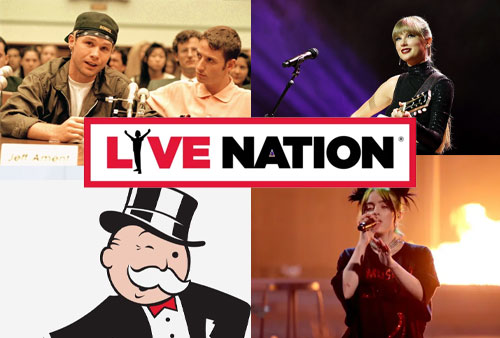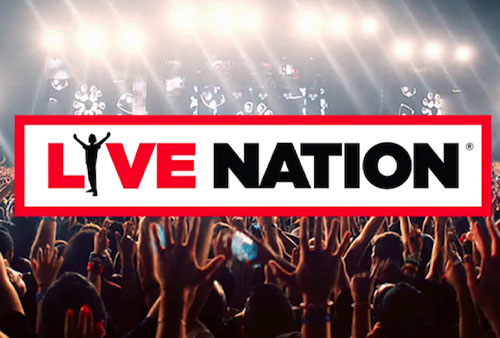- May 23, 2024
The U.S. Department of Justice (DOJ) is taking significant action against Live Nation and Ticketmaster, aiming to dismantle their powerful hold over the live event ticketing industry. In a federal antitrust lawsuit filed in Manhattan, the DOJ, backed by 30 states, accuses Live Nation of monopolistic practices that harm competition and inflate ticket prices.

Allegations of Anticompetitive Conduct
The lawsuit, spearheaded by Attorney General Merrick Garland, alleges that Live Nation exploits its dominant position to suppress competition in the ticketing industry. “We allege that Live Nation relies on unlawful, anticompetitive conduct to exercise its monopolistic control over the live events industry in the United States at the cost of fans, artists, smaller promoters, and venue operators,” Garland stated. The consequences, according to Garland, are higher ticket prices for fans, fewer opportunities for artists, squeezed-out smaller promoters, and limited choices for venues.
Joining the DOJ in this legal battle are 29 states and the District of Columbia, highlighting the widespread concern over Live Nation’s business practices. The case underscores the urgent need to address what the DOJ describes as an unfair and abusive market dynamic.
History of Antitrust Issues
The DOJ’s scrutiny of Live Nation isn’t new. An antitrust investigation was launched in early 2022 to determine if the company violated a consent decree established during its 2010 merger with Ticketmaster. This decree prohibited Live Nation from retaliating against venues that chose to use competing ticketing platforms. Despite this, a 2018 investigation found Live Nation engaging in retaliatory behavior, leading to a 2019 settlement that extended the consent decree to 2025.
The latest DOJ investigation delves deeper into Live Nation’s practices, including dynamic pricing, resale policies, and exclusive contracts with venues and artists. Ticketmaster, which controls between 70% and 80% of the primary ticket sales market in the U.S., is at the heart of these concerns.

Live Nation’s Defense
Live Nation has robustly defended itself against the DOJ’s allegations. Dan Wall, Live Nation’s executive vice president for corporate and regulatory affairs, issued a statement claiming the lawsuit is the result of political pressure and lobbying by rivals. Wall argued that the company does not fit the profile of a monopolist, noting, “The defining feature of a monopolist is monopoly profits derived from monopoly pricing. Live Nation in no way fits the profile.”
Wall further contended that many factors beyond Live Nation’s control contribute to high ticket prices, such as increasing production costs, artist popularity, and online scalping. He emphasized that Ticketmaster retains only a modest portion of service fees, with the majority going to venues. Wall also pointed out that Live Nation’s overall net profit margin is lower than many S&P 500 companies, arguing this contradicts the monopoly allegations.
Legislative Efforts for Transparency
In a parallel development, the U.S. House of Representatives passed the TICKET Act, aiming to reform the ticketing industry by increasing transparency. This bipartisan legislation, pending Senate approval and presidential signing, would require ticket retailers to display the “all-in” price of tickets upfront, including all fees. The act also seeks to curb speculative ticketing by ensuring resellers possess the tickets they advertise.
Historical Context and Market Influence
The merger of Live Nation and Ticketmaster in 2010 created a juggernaut in the live event industry, controlling significant portions of ticket sales and venue operations. Live Nation manages over 265 venues in North America, including more than 60 of the top amphitheaters. This extensive control allows Live Nation to lock artists and venues into exclusive contracts, reinforcing its market dominance.
The DOJ’s lawsuit accuses Live Nation of using its position to coerce venues into long-term contracts, threaten financial retaliation against competitors, and absorb smaller rivals. These practices, according to the DOJ, perpetuate a cycle that stifles competition and innovation, ultimately harming consumers.
Public Outcry and Industry Impact
Public frustration with Live Nation and Ticketmaster has been mounting, particularly after the disastrous rollout of tickets for Taylor Swift’s Eras tour. A surge of demand overwhelmed Ticketmaster’s system, leading to widespread outages and outrage among fans. This incident amplified calls for greater scrutiny of the company’s operations and business practices.
Fans and industry stakeholders argue that the current market dynamics leave little room for competition, resulting in higher ticket prices and fees. Critics claim that Live Nation’s dominant position allows it to dictate terms unfavorable to both artists and fans, further entrenching its market power.

Rising Concert Ticket Prices
Concert ticket prices have been steadily increasing, driven by various factors including production costs, artist fees, and market demand. While Live Nation attributes high prices to these external factors, critics argue that the company’s market dominance and control over ticketing services contribute significantly to the problem.
Artists and promoters often have limited options outside of Ticketmaster’s platform, giving Live Nation significant leverage in negotiations. This can result in higher service fees and ticket prices as venues and promoters pass on costs to consumers. Additionally, the prevalence of dynamic pricing models, where ticket prices fluctuate based on demand, exacerbates the issue.
A Call for Reform
The DOJ’s lawsuit represents a crucial step towards addressing these concerns and promoting a more competitive and transparent ticketing industry. Breaking up Live Nation and Ticketmaster could potentially lower ticket prices, increase competition, and foster innovation in the market. However, achieving these outcomes will require careful oversight and enforcement of antitrust regulations.
As the legal battle unfolds, the industry and consumers alike will be watching closely. The outcome could reshape the landscape of live event ticketing, offering a fairer and more accessible experience for fans and artists.
DOJ’s Pursuit
The DOJ’s pursuit to dismantle Live Nation and Ticketmaster marks a pivotal moment in the live event industry. Allegations of monopolistic practices and anticompetitive behavior have fueled a legal and public relations battle that could redefine market dynamics. As fans, artists, and industry stakeholders await the outcome, the case underscores the urgent need for transparency, competition, and fairness in the ticketing industry. The push for reform, exemplified by the TICKET Act and the DOJ’s lawsuit, highlights a broader movement towards accountability and consumer protection in the live event market.
Stay Updated With Breaking Recording Artist News, Tour Announcements, Weekly Featured Concert Tickets and subscribe to our YouTube Channel to stay connected with your favorite artists.
